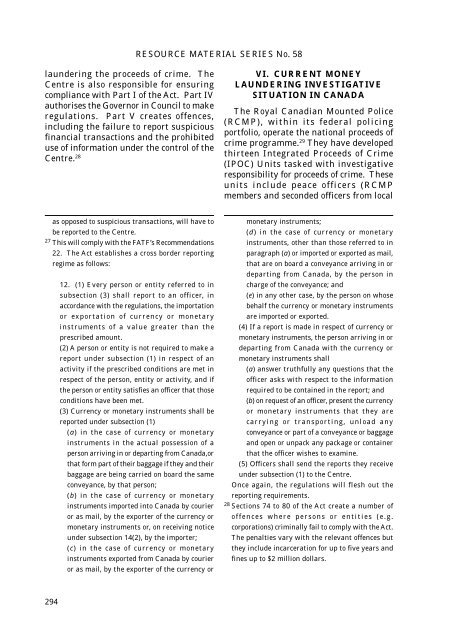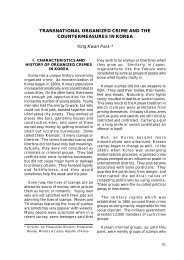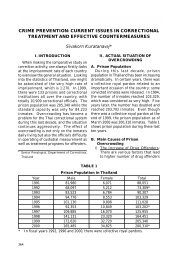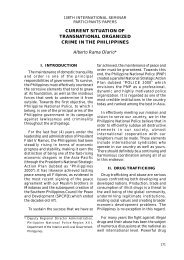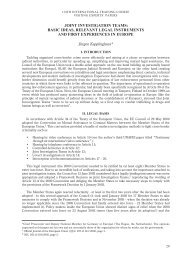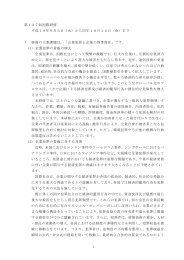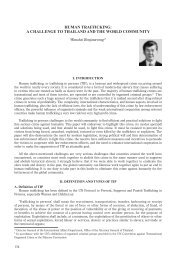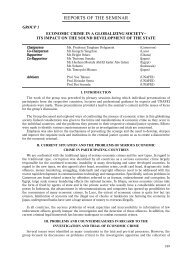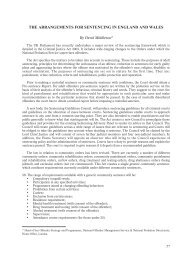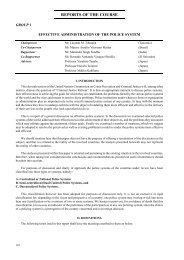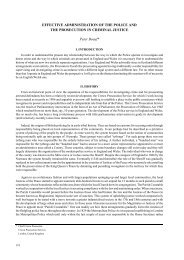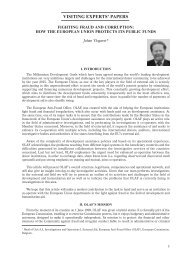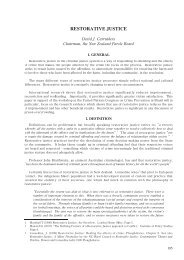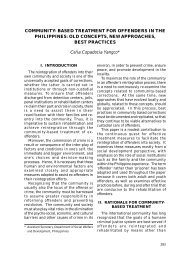CANADA'S ANTI-MONEY LAUNDERING REGIME Daniel P. Murphy *
CANADA'S ANTI-MONEY LAUNDERING REGIME Daniel P. Murphy *
CANADA'S ANTI-MONEY LAUNDERING REGIME Daniel P. Murphy *
You also want an ePaper? Increase the reach of your titles
YUMPU automatically turns print PDFs into web optimized ePapers that Google loves.
RESOURCE MATERIAL SERIES No. 58laundering the proceeds of crime. TheCentre is also responsible for ensuringcompliance with Part I of the Act. Part IVauthorises the Governor in Council to makeregulations. Part V creates offences,including the failure to report suspiciousfinancial transactions and the prohibiteduse of information under the control of theCentre. 28VI. CURRENT <strong>MONEY</strong><strong>LAUNDERING</strong> INVESTIGATIVESITUATION IN CANADAThe Royal Canadian Mounted Police(RCMP), within its federal policingportfolio, operate the national proceeds ofcrime programme. 29 They have developedthirteen Integrated Proceeds of Crime(IPOC) Units tasked with investigativeresponsibility for proceeds of crime. Theseunits include peace officers (RCMPmembers and seconded officers from localas opposed to suspicious transactions, will have tobe reported to the Centre.27 This will comply with the FATF’s Recommendations22. The Act establishes a cross border reportingregime as follows:12. (1) Every person or entity referred to insubsection (3) shall report to an officer, inaccordance with the regulations, the importationor exportation of currency or monetaryinstruments of a value greater than theprescribed amount.(2) A person or entity is not required to make areport under subsection (1) in respect of anactivity if the prescribed conditions are met inrespect of the person, entity or activity, and ifthe person or entity satisfies an officer that thoseconditions have been met.(3) Currency or monetary instruments shall bereported under subsection (1)(a) in the case of currency or monetaryinstruments in the actual possession of aperson arriving in or departing from Canada,orthat form part of their baggage if they and theirbaggage are being carried on board the sameconveyance, by that person;(b) in the case of currency or monetaryinstruments imported into Canada by courieror as mail, by the exporter of the currency ormonetary instruments or, on receiving noticeunder subsection 14(2), by the importer;(c) in the case of currency or monetaryinstruments exported from Canada by courieror as mail, by the exporter of the currency ormonetary instruments;(d) in the case of currency or monetaryinstruments, other than those referred to inparagraph (a) or imported or exported as mail,that are on board a conveyance arriving in ordeparting from Canada, by the person incharge of the conveyance; and(e) in any other case, by the person on whosebehalf the currency or monetary instrumentsare imported or exported.(4) If a report is made in respect of currency ormonetary instruments, the person arriving in ordeparting from Canada with the currency ormonetary instruments shall(a) answer truthfully any questions that theofficer asks with respect to the informationrequired to be contained in the report; and(b) on request of an officer, present the currencyor monetary instruments that they arecarrying or transporting, unload anyconveyance or part of a conveyance or baggageand open or unpack any package or containerthat the officer wishes to examine.(5) Officers shall send the reports they receiveunder subsection (1) to the Centre.Once again, the regulations will flesh out thereporting requirements.28 Sections 74 to 80 of the Act create a number ofoffences where persons or entities (e.g.corporations) criminally fail to comply with the Act.The penalties vary with the relevant offences butthey include incarceration for up to five years andfines up to $2 million dollars.294


